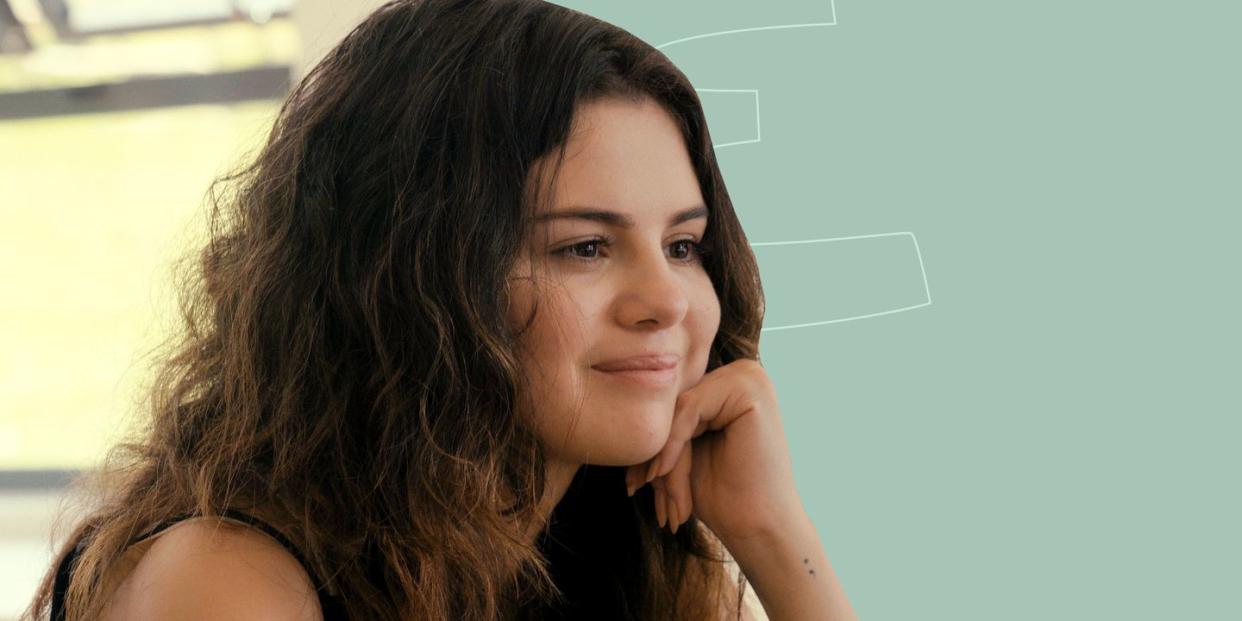Selena Gomez's 'My Mind & Me' is Anything But Celebrity Fluff

A friend of mine recently confessed they don’t love Selena Gomez’s “brand.” Not because she’s done anything wrong—in fact, her 20-year career has been remarkably scandal-free—but because of her seemingly spotless, sunny disposition, which at times, can read as inauthentic. After all, this friend reasoned, Gomez is a celebrity with an exuberant amount of resources at her disposal. Any problem should, theoretically, be solvable.
In the moment I quietly nodded, and sipped my wine while judging the singer. We all know fame can't buy peace of mind, but it’s hard to believe it doesn’t help. As a fan of Gomez, I was surprised by my response, until I remembered the artist hasn’t been online in over four years. How can you preach mental wellness to 354 million Instagram followers without even using the app? Maybe her brand really was bullshit.
Earlier this year, Gomez launched her mental-fitness program, Wondermind, then announced her documentary, Selena Gomez: My Mind & Me. It all seemed like a perfectly curated media push. A fluff piece crafted to establish herself as our generation's ideal role model. But after watching the film, which debuted on Apple TV+ this Friday, it’s clear that is not the case. None of this is bullshit. If anything, her “brand” is her road to recovery after enduring two decades of crushing stardom.
My Mind & Me begins in 2016, with Gomez preparing for her then-soon-to-be canceled Revival tour. After her final rehearsal, she has a breakdown, crying to her team about feeling unprepared—despite the runthrough going well. “I have no idea what the fuck I’m doing,” she says, before sobbing at the thought of John Janick, the CEO of Interscope Records, regretting his decision to sign a “fucking Disney kid” to his label.
She has a panic attack, but doesn’t have the words to explain it, so she wipes the tears away and gets back to work. The tour begins in Las Vegas, but after 54 performances, her calendar is wiped clean and Gomez checks into a psychiatric facility. Only then does the term “mental health” make it into her vocabulary. Two years later, Gomez experiences a horrifying bout of psychosis, hearing voices in her head, which prompts a depressive state. Then, finally, in 2018 she is diagnosed as bipolar while battling lupus, a long-term autoimmune disorder.
A team of cameras captured it all and the footage became My Mind & Me—a harrowing documentary that nearly got shelved because of its unflinching honesty. In an interview with Rolling Stone, Gomez said, “Because I have the platform I have, it’s kind of like I’m sacrificing myself a bit for a greater purpose. I don’t want that to sound dramatic, but I almost wasn’t going to put this out. God’s honest truth, a few weeks ago, I wasn’t sure I could do it.”
To be fair, the documentary is wildly vulnerable. I’d be nervous too. Gomez is not always her best self. She cries a lot and has trouble getting out of bed. Sometimes she has fun with friends, and in other moments she lashes out. She gets annoyed during press interviews and gives dry, sarcastic, responses. At times she can be cruel, but she’s also selfless and kind. Human, in other words.
Overall, the film is a refreshingly honest look at someone whose career oftentimes surpasses their individual self. Gomez isn’t just an artist, she’s a figurehead, and the pressure nearly took her out. This documentary could have easily been about her road to fame, peppered with difficult circumstances that are ultimately bearable. Nearly every chart-topping musician has one. But Gomez’s willingness to let the viewers see everything, in a world where authenticity is often traded for perfection and “aesthetics,” is truly brave. In My Mind & Me Gomez gives us the opportunity to see her worst moments, and in turn, wrestle our own struggles.
In the documentary's final moments, Gomez grapples with her diagnosis, and what will likely be a life-long journey to self discovery. “I found that having a relationship with bipolar and myself, it’s going to be there,” she says. “I’m just making it my friend now. I think I needed to go through it to be who I am.”
You Might Also Like


